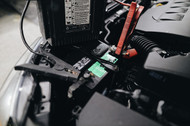How the Summer Heat Can Affect Your Car Battery
24th Jun 2021

There's nothing more frustrating than turning your car's ignition, only to discover that the battery is dead. Automotive batteries don't last forever. Research shows that most of them last for about two to five years. While failure can occur anytime, though, car batteries have a higher risk of failure during the summer as opposed to the cooler months of the year.
Increased Electrical Usage
One of the reasons why car batteries are more likely to fail during the summer is because of increased electrical usage. You'll probably use the cabin air conditioner, for instance, to stay cool when driving during the summer. Cabin air conditioners are complete cooling systems that, like most cooling systems, are powered by electricity. Your car will draw power from the battery when the cabin air conditioner is running.
Conversely, the cabin heater use only a minimal amount of electricity. They consist of a heater core through which hot coolant passes. The only electricity consumed by cabin heaters is that for the blower fan. The actual heater core doesn't use electricity.
Loss of Electrolytes
The summer heat can cause a loss of electrolytes in car batteries. Electrolytes are the "stuff" that allows your car battery to hold a charge. It consists of conductive liquid that's stored inside of the battery's core. Car batteries, however, can lose their electrolytes through evaporation. As the electrolytes evaporate out of your car battery, you may struggle to start your car.
Electrolytes are more likely to evaporate out of your car battery during the summer. When the summer heat arrives, it will draw out the electrolytes. When levels of electrolytes drop far enough, it can lead to problems with your car battery. Heat accelerates evaporation, which is one of the reasons why car batteries often fail during the summer.
Corrosion Buildup
There's also the potential for corrosion buildup during the summer. Corrosion buildup involves the formation of iron oxide on the terminals of your car battery. During the summer, corrosion can occur from rainwater sitting on the battery terminals.
If your car battery is suffering from corrosion buildup, you should try cleaning it. Using some baking soda and a wire brush, scrub the terminals to remove the corrosion. Once the corrosion has been removed, your car battery should behave normally -- assuming it's still able to hold a charge. If it doesn't hold a charge, you'll probably have to replace your car battery to get back on the road.

